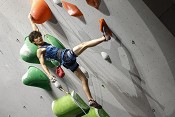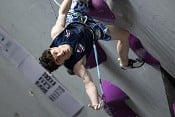
The next round of the IFSC World Cup took place in Briançon last weekend. As the final event before Paris 2024, many qualified athletes chose to sit this event out, but a few used it for some last-minute practice. The Speed discipline had never been part of the 13-year-long-running Briançon event – until now. Japan reigned supreme in Lead, with two first-time gold medallists: Zento Murashita and Mei Kotake. In Speed, Lijuan Deng (CHN) earned a confidence-inspiring gold ahead of Paris 2024 and Tokyo 2020 Olympian Ludovico Fossali won his first-ever World Cup gold.
Lead
In the men's final that opened the night, Team Japan placed three of their six finalists on the podium, with Murashita Zento winning gold with a score of 47, Yoshida Satone following in close second place with 45, and Omata Shion completing the sweep and earning bronze with 42+. This is the second year in a row that Japanese men have dominated the Briançon podium.
The route involved a delicate bridging section in which most of the athletes had to spin and face the crowd.
In the previous round, Murashita, Yoshida and Omata all managed to top the men's semi-final route.
"I'm very happy, this result is a bit surprising to me. I was able to climb to my limit, and climb very well," said first-time gold medallist Murashita.
Finishing in fourth position in his first final participation was home favourite Max Bertone, who ended with the same score as Omata, 42+. Also at 42+ was Germany's Sebastian Halenke, who took fifth place.
Three more Japanese climbers finished in the bottom three position of the final: Ishizu Mototaka finished sixth with 41+, Tanaka Shuta followed in seventh with 39, and Imaizumi Yuta finished in eighth with 38+.
Also winning her first World Cup gold medal ever was 27-year-old Kotake Mei, who entered the stage as the fourth seed, but managed to climb higher than all her rivals, finally placing at the top of the ranking in her 25th Lead World Cup. The women's route featured an intimidating but doable laché-style dyno, which all the women completed despite some nerve-wracking moments.
Kotake, who won bronze at the World Cup in Chamonix only a few days ago, finished ahead of Italy's Laura Rogora – one of the few athletes qualified for Paris 2024 who competed in Briançon. Rogora won silver with a score of 45.
"I still can't believe I have won my first gold. It's been a long journey for me to get on the World Cup podium. With many of the top climbers not competing, I thought it was my time to win, and I'm happy I made it," an emotional Kotake said moments before the podium.
Third place went to Austria's Mattea Pötzi, who finally claimed her first-ever World Cup medal in her third consecutive Lead final round.
Speed
China's Deng Lijuan won gold in the women's Speed event and led an all-Asian podium that also included South Korea's Jeong Jimin and teammate Zhang Shaoqin.
In the final, Deng clocked four sub-seven times, from the 6.87 seconds she recorded in the round of 16, to the 6.62 in the following quarter-final, to the 6.48 with which she beat another Chinese climber, Wang Shengyan.
In the race for the gold medal, the 24-year-old from Beijing set a new personal best with 6.41 seconds, while Jeong had to settle for silver. The South Korean specialist also updated her own PB and stopped the clock at 6.53.
"I am very happy," said Deng. "I can't wait to be in Paris for the Olympics. This win gives me so much confidence."
"I'm so excited about winning silver," added Jeong. "It is the first silver in the history of my country, a record. So far, the best result was a third place, a bronze. I'm so happy."
In the bronze medal race, Zhang Shaoqin bested Wang and placed third with 6.46 seconds.
The men's Speed final also lived up to the expectations of the crowd, offering a neck-and-neck race for gold between two of the most experienced climbers in the circuit: Ludovico Fossali of Italy and Erik Noya Cardona of Spain.
Fossali, the 2019 men's Speed world champion in Hachioji, Japan, ran his first-ever sub-five and won gold with 4.97 – equalling the current men's European record and taking the second World Cup win of his career. Noya Cardona won silver with 5.06.
Fossali said: "It feels good, really good! It's been a difficult year so far, I know that with consistency and time I could achieve my goals. I'm very proud of this, it helps me forget the first part of the season.
"It was my first sub-five, it feels pretty nice. I don't usually watch the time, I just watch if it's green or red."
The podium was completed by China's Long Jianguo, who placed third after beating Germany's Leander Carmanns in the bronze medal race. Long finished with 4.93, Carmanns with 5.06 – both set a new personal best.
Despite many of the top-ranked athletes missing from the starting lists, there were plenty of new personal bests set, along with two continental records: Josh Bruyns of South Africa stopped the clock at 5.71 seconds, besting the time he previously set at last week's World Cup in Chamonix, France; while Julian David of New Zealand continued his progression and wrote a new Oceania record in both of his qualification runs – first with 5.40, then with 5.26.






















Comments